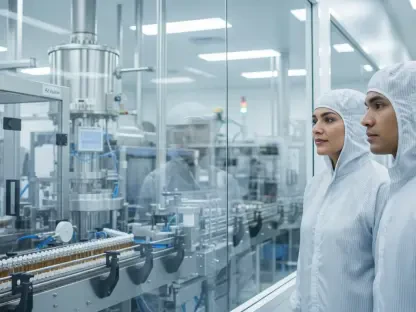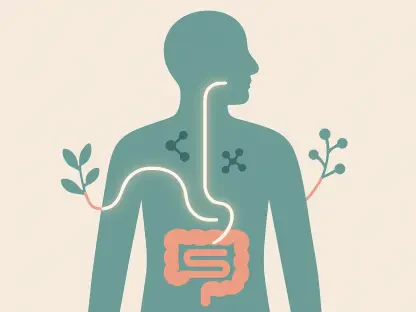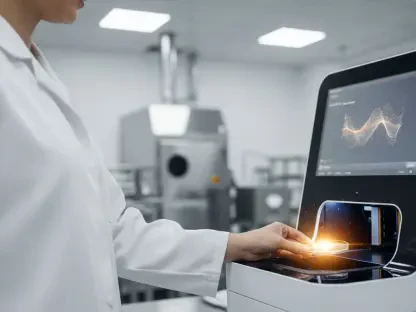In a remarkable leap forward for medical science, researchers at McMaster University in Canada have introduced a groundbreaking antibiotic named enterololin, tailored specifically to combat inflammatory bowel disease (IBD), which encompasses debilitating conditions like Crohn’s disease. This pioneering work, detailed in a recent publication in Nature Microbiology on October 3, was spearheaded by Assistant Professor Jon Stokes from the Department of Biochemistry and Biomedical Sciences. The discovery not only promises a new lifeline for millions of patients grappling with chronic gut inflammation but also showcases the transformative power of artificial intelligence (AI) in modern drug development. By merging cutting-edge technology with traditional scientific expertise, the team has significantly fast-tracked the creation and understanding of this novel treatment, addressing critical challenges like antibiotic resistance and the lack of effective therapies for IBD. This achievement signals a potential shift in how complex health issues are tackled in the future.
Tackling the Challenges of IBD Therapy
The treatment landscape for IBD has long been fraught with complications, primarily due to the inefficacy and unintended consequences of broad-spectrum antibiotics. These drugs, while designed to eliminate harmful bacteria, often indiscriminately destroy beneficial gut microbes, leading to a disrupted microbiome. Such imbalance can exacerbate inflammation and create fertile ground for drug-resistant pathogens like Escherichia coli (E. coli) to thrive in the intestines. This vicious cycle poses a significant barrier to effective care, leaving patients with limited options and worsening symptoms over time. The urgent need for a more precise approach has driven researchers to seek alternatives that can target specific harmful bacteria without collateral damage to the gut’s delicate ecosystem, setting the stage for innovative solutions to emerge in the field of gastroenterology.
Enter enterololin, a narrow-spectrum antibiotic developed to address these very limitations with remarkable specificity. Unlike its broad-spectrum counterparts, this drug zeroes in on the Enterobacteriaceae family, which includes notorious pathogens like E. coli, while largely sparing the beneficial bacteria essential for gut health. This targeted mechanism offers a dual benefit: it curbs the spread of harmful microbes directly linked to IBD flare-ups and minimizes the risk of fostering antibiotic resistance—a growing global concern. By preserving the microbiome’s balance, enterololin represents a safer and potentially more sustainable option for long-term management of chronic intestinal conditions, providing hope to patients who have struggled with the adverse effects of existing treatments.
AI’s Revolutionary Role in Drug Innovation
The development of enterololin marks a watershed moment not just for IBD treatment but for the broader field of drug discovery, thanks to the integration of AI technology. Traditionally, determining a drug’s mechanism of action (MOA)—how it interacts with biological targets to produce therapeutic effects—has been a laborious and costly endeavor, often spanning two years and demanding investments of around $2 million per study. However, in collaboration with MIT’s Computer Science and Artificial Intelligence Lab (CSAIL), Stokes’ team harnessed an AI model called DiffDock to predict enterololin’s MOA in a mere 100 seconds. The model identified the LolCDE protein complex as the drug’s target, a hypothesis later confirmed through lab validation led by PhD candidate Denise Catacutan. This process took just six months and cost a fraction of the usual amount at $60,000, illustrating AI’s capacity to redefine efficiency in pharmaceutical research.
Beyond sheer speed, AI’s application in this context opens new frontiers in understanding and refining drug candidates. While AI tools have previously been employed to screen vast chemical databases for potential compounds, their use in decoding MOA represents a significant evolution. This advancement accelerates the transition from initial discovery to clinical application by providing rapid insights into how a drug functions at a molecular level. Such efficiency also enhances critical aspects like safety profiling and dosage optimization, which are pivotal for regulatory approval and patient outcomes. The synergy between McMaster’s researchers and MIT’s technological expertise underscores a powerful model of collaboration, where AI serves as a predictive guide that complements and streamlines the rigorous experimental validation conducted in laboratories.
Bridging the Gap from Research to Real-World Impact
The journey of enterololin from a lab discovery to a potential treatment in hospitals is already underway, driven by a clear focus on translational outcomes. Stokes’ spin-out company, Stoked Bio, has taken on the responsibility of licensing and optimizing the antibiotic for human use, reflecting a commitment to bridging the gap between academic innovation and tangible patient benefits. Early testing against other drug-resistant bacteria, such as Klebsiella, has yielded promising results, suggesting that enterololin could have broader applications beyond IBD. With human trials ambitiously targeted within the next three years, the team is working against the clock to deliver this therapy to those in need. Jeff Skinner, CEO of Stoked Bio, has emphasized the importance of translating such cutting-edge research into practical solutions, highlighting the real-world stakes of this endeavor.
This development also reflects a larger trend in biomedical research, where AI is increasingly integrated as a vital tool to address pressing health crises like antibiotic resistance. Stokes has poignantly described this issue as akin to a “leaky faucet” that risks becoming a catastrophic “flood” if not addressed with urgency and innovation. Experts, including MIT’s Regina Barzilay, stress that AI is not a standalone solution but a complementary asset that amplifies the precision and speed of traditional scientific methods. This consensus points to a future where technology and human expertise coalesce to tackle complex challenges more effectively, potentially reshaping the landscape of medical research and treatment development for conditions far beyond IBD.
Looking Ahead to a New Era in Medicine
Reflecting on the emotional and ethical dimensions of this breakthrough, insights from team members like Denise Catacutan reveal the human heart behind the high-tech achievement. Her reflections on witnessing a lab discovery evolve into a potential therapy for suffering patients highlight the profound personal motivation driving the research. This blend of technological prowess with a deep-seated commitment to improving lives paints an inspiring vision of what medicine can achieve when innovation is paired with purpose. It serves as a reminder that each scientific milestone is ultimately rooted in the desire to alleviate human suffering, adding a poignant layer to the technical narrative of enterololin’s development.
As the dust settles on this remarkable discovery, the path forward becomes clearer for stakeholders in the fight against IBD and antibiotic resistance. The success of enterololin paves the way for further exploration of narrow-spectrum antibiotics, urging researchers to prioritize microbiome-friendly treatments. Stoked Bio’s ongoing efforts to refine the drug and initiate human trials within a tight timeline signal a proactive approach to implementation. Meanwhile, the precedent set by AI’s role in decoding MOA encourages broader adoption of such tools in drug discovery pipelines. These steps, taken in the wake of McMaster’s achievement, offer a roadmap for future innovations, ensuring that the momentum of this breakthrough continues to drive progress in addressing some of the most intractable health challenges faced by millions worldwide.









